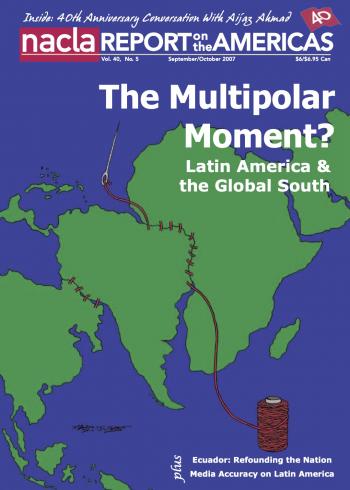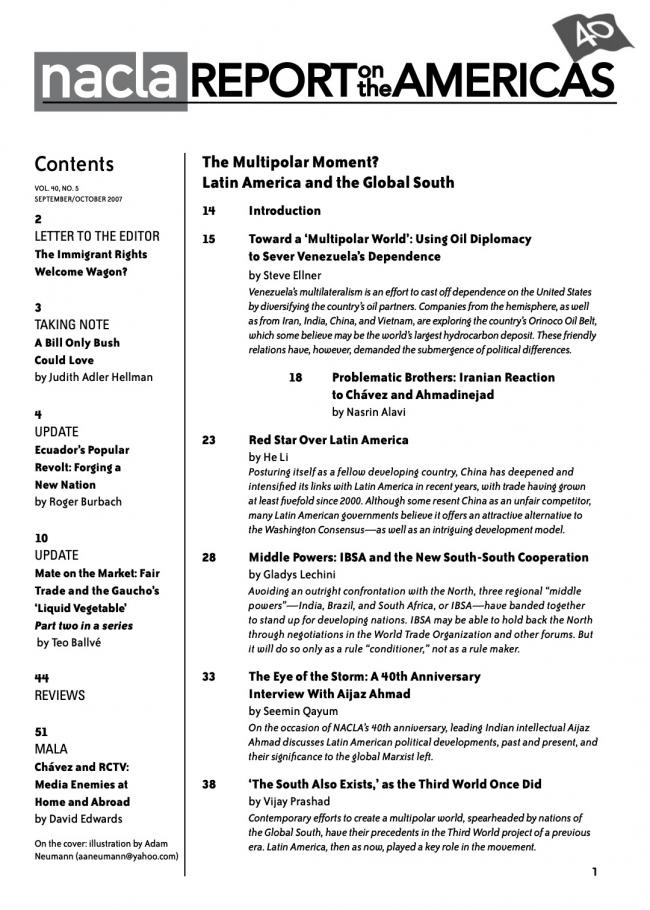Report
Today, a new, more selective South-South cooperation has appeared, bringing some hope to the people of our regions. The trilateral alliance known as the India, Brazil, and South Africa Dialogue Forum, or IBSA, exemplifies the trend. From IBSA’s perspective, the current international economic and financial architecture has ill-served the interests of the poor in developing countries, with economic globalization having exacerbated income inequality both within and across emerging markets. The alliance’s objective is to maximize joint actions as part of a coherent strategy within international organizations like the World Trade Organization (WTO) on various issues, including public health, pharmaceutical patents, and government subsidies.
Titillating as it may be in the West to conjure images of the dastardly Ahmadjinejad-Chávez double act — the second coming of Hitler meets the banana republic dictator — for many ordinary Iranians, Chávez, whatever his accomplishments in Venezuela, is another in a series of foreign leaders whom the Iranian government has hosted since the 1979 Islamic Revolution, including Robert Mugabe of Zimbabwe and Alexander Lukashenko of Belarus.
Since the Bandung Conference of 1955, China has consistently identified itself with the developing world, calling itself the “world’s largest developing country” and making constant reference to its shared historical experience of colonialism with the other states of Asia, Africa, and Latin America. Yet until recently, Latin America was a low priority for Beijing, which viewed the region as too geographically remote to be relevant to the international relationships that preoccupied it, especially those with the major powers and neighboring countries.
Shawn Smallman’s The AIDS Pandemic in Latin America, an ambitious new study of the history of AIDS in the region, will provide conference-goers and anyone interested in the topic with an excellent introduction.
Aijaz Ahmad is a leading Marxist intellectual and academic based in New Delhi, India. He has written widely on political and cultural theory, colonialism, and imperialism, and has taught in a number of universities in India and the West.
In June, Venezuelan president Hugo Chávez made his sixth diplomatic trip to Iran. Discussions were held there, as well as in Russia and Belarus, further boosting international cooperation in developing Venezuela’s immense Orinoco Oil Belt. Iran’s participation in the Venezuelan oil industry dates back to September 2006, when President Mahmoud Ahmadinejad presided over the initial perforation of a well in Ayacucho 7, one of 27 blocks in the Orinoco Belt, which some believe may be the world’s largest oil deposit.
I first saw Fidel Castro in Durban, at the World Conference Against Racism (WCAR) in 2001. Lucky to have passes to both the ministerial and the nongovernmental meeting, I got to see him speak twice. At both events, Castro received standing ovations. He was extraordinary, schooling us on the massive ecological and economic crisis faced by the planet, and then, with his inimitable sense of optimism, he said, “History has demonstrated that great solutions have only emerged from great crises.” The Durban conference culminated several years of political work to raise issues of oppression and to seek a common solution to several injustices. But a few days after the final ceremony, the September 11 attacks occurred. The Durban dynamic was an early casualty of the war on terror.


